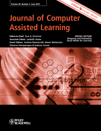
JOURNAL OF COMPUTER ASSISTED LEARNING
Scope & Guideline
Pioneering Research in Computer-Assisted Education
Introduction
Aims and Scopes
- Integration of Technology in Education:
The journal explores how various technologies, including virtual reality, augmented reality, and artificial intelligence, can be effectively integrated into educational settings to enhance learning outcomes. - Innovative Pedagogical Approaches:
It emphasizes innovative teaching methodologies, such as gamification, collaborative learning, and inquiry-based learning, that leverage technology to foster engagement and improve student performance. - Learning Analytics and Data-Driven Insights:
The journal promotes the use of learning analytics to assess and enhance the educational process, providing insights into student behaviors, engagement, and learning outcomes. - Focus on Diverse Learning Environments:
Research published in the journal addresses a variety of learning environments, including K-12, higher education, and informal settings, highlighting the applicability of computer-assisted learning across different contexts. - Emphasis on Self-Regulated Learning:
The exploration of self-regulated learning strategies is a core area of focus, examining how technology can support students in managing their own learning processes.
Trending and Emerging
- Artificial Intelligence in Education:
There is a growing trend in exploring the applications of artificial intelligence in educational contexts, particularly in enhancing personalized learning experiences, automated feedback, and adaptive learning systems. - Gamification and Game-Based Learning:
Research focusing on gamification and game-based learning strategies is on the rise, highlighting their effectiveness in increasing student motivation and engagement in educational settings. - Augmented and Virtual Reality Applications:
The use of augmented reality (AR) and virtual reality (VR) in education is becoming increasingly popular, with studies examining their impact on immersive learning experiences and student engagement. - Collaborative Learning Technologies:
Emerging research is focusing on collaborative learning technologies that facilitate peer interaction, social presence, and collaborative problem-solving in both online and blended learning environments. - Learning Analytics and Personalization:
The trend towards utilizing learning analytics for personalizing educational experiences is gaining momentum, with a focus on how data can inform instructional design and improve student outcomes.
Declining or Waning
- Traditional Computer-Assisted Instruction:
Research centered on traditional computer-assisted instruction methods appears to be diminishing, as newer, more interactive and engaging technologies gain traction in educational settings. - General Pedagogical Strategies without Technology Focus:
There is a noticeable decrease in papers that discuss generic pedagogical strategies without a specific focus on integrating technology, indicating a shift towards more technology-enhanced educational practices. - Static Learning Materials:
Research related to static or non-interactive digital learning materials is becoming less frequent, as the emphasis shifts towards dynamic, interactive, and engaging learning experiences that utilize advanced technologies. - Standardized Testing and Assessment:
The focus on traditional forms of assessment and standardized testing is waning, as the journal increasingly prioritizes innovative assessment methods that leverage technology and formative feedback.
Similar Journals

E-Learning and Digital Media
Advancing knowledge at the intersection of technology and education.E-Learning and Digital Media, published by SAGE Publications Inc, is a premier academic journal dedicated to the innovative intersection of digital technologies and education. With a strong commitment to advancing research in the fields of education and computer science, this journal has established itself as a vital resource for researchers, professionals, and students alike. As of 2023, it proudly holds a Q2 ranking in both Computer Science Applications and Education, reflecting its impact and reach within the academic community. The journal encompasses a wide range of topics exploring the effectiveness and applications of e-learning technologies, pedagogical strategies, and digital media in educational settings. Since its inception in 2009, E-Learning and Digital Media has continuously contributed to the understanding and development of digital education, ensuring relevancy in an ever-evolving landscape. With an open access model intended to foster accessibility and dissemination of knowledge, this journal invites submissions that push the boundaries of traditional education through cutting-edge research and practice.
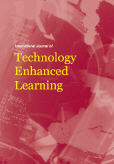
International Journal of Technology Enhanced Learning
Exploring New Frontiers in Technology-Enhanced EducationInternational Journal of Technology Enhanced Learning, published by INDERSCIENCE ENTERPRISES LTD, is a premier scholarly journal that comprehensively explores the intersection of technology and education, fostering innovative approaches to enhance learning processes. Established in 2008 and continuing through 2024, the journal is pivotal for researchers, educators, and technology professionals aiming to disseminate and engage with cutting-edge developments in technology-enhanced learning environments. With an admirable ranking in Scopus—placing in the 72nd percentile of Education and 49th in Computer Science Applications—the journal reflects a robust influence in the fields of Computer Science Applications and Education, as evidenced by its Q2 and Q3 quartile rankings. The journal not only provides a platform for empirical research and theoretical discourse but also emphasizes practical implementations in e-learning. Although it does not offer open access, its curated collection of articles serves as a vital resource for scholars and practitioners who are dedicated to advancing the nexus of technology and education.
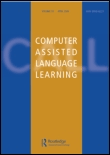
Computer Assisted Language Learning
Exploring the Intersection of Technology and Language AcquisitionComputer Assisted Language Learning is a prestigious journal dedicated to the interdisciplinary field of language education technology, published by Routledge Journals, Taylor & Francis Ltd. With its ISSN 0958-8221 and E-ISSN 1744-3210, the journal has become a cornerstone for researchers and practitioners interested in the innovative integration of computer technology in language learning processes. As of 2023, it holds an impressive impact factor, ranking Q1 in both Computer Science Applications and Linguistics and Language categories, indicating its significance within these scholarly domains. The journal covers a wide array of subjects, including language acquisition, educational technology, and instructional design, facilitating an understanding of how digital tools can enhance language learning experiences. Its rigorous editorial standards ensure that published articles undergo thorough peer review, making it a highly respected platform for disseminating cutting-edge research. With an extensive publication history dating back to 1990 and an ongoing commitment to exploring the dynamics of language learning in digital contexts, this journal is essential for academics, educators, and students alike who are looking to stay at the forefront of research in computer-assisted language education.
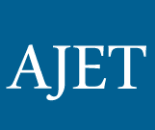
Australasian Journal of Educational Technology
Pioneering Research for a Digital Learning RevolutionAustralasian Journal of Educational Technology (AJET), a premier peer-reviewed journal published by the Australasian Society for Computers in Learning in Tertiary Education (ASCILITE), has been at the forefront of advancements in educational technology since its inception in 1985. With an impressive Q1 ranking in both Education and E-learning categories for 2023, this open access journal (ISSN: 1449-3098, E-ISSN: 1449-5554) serves as a vital platform for researchers, practitioners, and students aiming to disseminate innovative research and practices in the use of technology for teaching and learning in tertiary education. Based in Australia and accessible to a global audience, AJET is committed to enhancing educational outcomes through the integration of technology, fostering a vibrant community of scholarship and collaboration among educators and industry professionals. With its high impact ranking (Rank #105/1543 in Social Sciences - Education), AJET remains a significant contributor to the scholarly discussion on effective learning environments in an increasingly digital world.
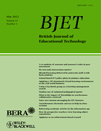
BRITISH JOURNAL OF EDUCATIONAL TECHNOLOGY
Fostering Collaboration in the E-Learning LandscapeBRITISH JOURNAL OF EDUCATIONAL TECHNOLOGY, published by Wiley, is a leading journal in the field of educational technology, recognized for its commitment to advancing research and practice in this dynamic arena. With an impressive impact factor that places it in the Q1 quartile for both Education and E-learning in 2023, it serves as a critical resource for academics, practitioners, and policymakers alike. This journal, with an established publication history since 1970, focuses on the integration of technology in educational settings, aiming to disseminate innovative findings and facilitate discussions that enhance learning experiences. Researchers contributing to the journal address diverse topics from digital learning environments to the pedagogical implications of emerging technologies, ensuring comprehensive coverage of the latest trends and methodologies. Submissions are welcomed in various formats, promoting collaborative scholarly dialogue in fostering effective educational practices. Access to the journal is available through traditional subscription frameworks, ensuring broad accessibility for institutions and individuals invested in the advancement of educational technology.

Journal of Information Technology Education-Innovations in Practice
Advancing Pedagogy with Innovative InsightsThe Journal of Information Technology Education-Innovations in Practice (ISSN: 2165-3151; E-ISSN: 2165-316X), published by the Informing Science Institute, serves as a vital resource for researchers and practitioners in the intersection of information technology and education. With a focus on innovative practices and pedagogical advancements, this journal aims to disseminate high-quality research that enhances teaching methodologies and learning experiences in the digital age. Having demonstrated its relevance within the academic community, it proudly holds a Q3 category ranking in both Computer Science and Education fields as of 2023, alongside commendable Scopus rankings, namely #812 out of 1543 in Social Sciences Education and #92 out of 133 in Computer Science (miscellaneous). As a platform that actively promotes open access knowledge, the journal encourages boundary-pushing inquiries while catering to the evolving needs of educators and technology specialists alike. With its convergence period spanning from 2015 to 2024, the journal is poised to play a significant role in shaping the future of IT education.

Technology Knowledge and Learning
Shaping the Future of Educational Technology ResearchTechnology Knowledge and Learning, published by SPRINGER, stands as a pivotal platform in the realms of computational theory, computer science, education, and human-computer interaction. With an impressive impact factor reflecting its reputation, this journal has consistently ranked in the Q1 quartile across multiple categories as of 2023, including Computational Theory and Mathematics, Education, and Engineering. Spanning a timeline from 2011 to 2024, it serves as an essential resource for those engaged in exploring the intersections of technology, pedagogy, and knowledge transfer, thereby facilitating advancements in both theory and practical applications. Although it is not an open-access journal, the rigorous peer-review process ensures that only the highest quality research contributes to its esteemed reputation. By providing a platform for innovative research and discussions, Technology Knowledge and Learning plays a crucial role in shaping the future of technological education and applications, making it an invaluable resource for researchers, professionals, and students alike, seeking to stay at the forefront of this dynamic field.

International Journal of Technology in Education
Transforming Teaching with Innovative InsightsThe International Journal of Technology in Education, published by the International Society for Technology Education & Science (ISTES), serves as a vital platform for researchers, educators, and practitioners devoted to the intersection of technology and educational practices. With an E-ISSN of 2689-2758, this journal aims to showcase innovative research, case studies, and theoretical contributions that explore how emerging technologies can enhance teaching and learning. Although specific metrics like impact factor and HIndex are currently unavailable, the journal is committed to rigorous peer review and high academic standards, ensuring that all published work contributes meaningfully to the evolving landscape of educational technology. As an open-access journal, it strives to make research widely available, fostering collaboration and knowledge sharing among its audience. Whether you are a researcher exploring new horizons or a professional seeking practical applications of technology in education, the International Journal of Technology in Education is an indispensable resource.

Contemporary Educational Technology
Exploring the Future of Education and TechnologyContemporary Educational Technology is a premier journal published by BASTAS PUBL LTD - UK, specializing in the dynamic intersection of educational practices and technological advancements. With an E-ISSN of 1309-517X, this journal serves as a vital resource for researchers, educators, and professionals keen to explore innovative solutions and methodologies in education. Ranked in the Q2 category for both Education and Management of Technology and Innovation in 2023, Contemporary Educational Technology boasts impressive Scopus ranks, standing at #187 out of 1543 in the Social Sciences Education field, reflecting its influence and contribution to contemporary research. Through its open-access approach, this journal facilitates the dissemination of knowledge, making cutting-edge research readily available to a global audience. By examining developments from 2018 through 2024, it aims to critically analyze and promote the integration of technology in educational contexts, thereby fostering improved learning outcomes and innovative teaching practices.
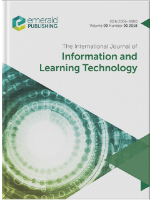
International Journal of Information and Learning Technology
Transforming Education with Insightful Technology StudiesInternational Journal of Information and Learning Technology is a pivotal publication in the fields of computer science and education, published by the esteemed Emerald Group Publishing Ltd. With an ISSN of 2056-4880, this journal has positioned itself as a valuable resource, reflecting a commitment to high-quality research and discourse in information technology and learning methodologies. Recognized for its significant contributions, it holds a respectable Q2 ranking in both Computer Networks and Communications and Computer Science Applications, along with a prestigious Q1 ranking in Education for the year 2023. The journal spans an expansive converged period from 2015 to 2024, providing an extensive archive of innovative ideas and findings that are instrumental to researchers, educators, and IT professionals alike. Although currently not open access, the publication remains vital to the academic community, ensuring that cutting-edge research and discussions continue to inform and inspire advancements in the integration of technology within learning environments. From its base in Leeds, United Kingdom, the journal invites submissions that explore the nexus of technology and education, fostering a deeper understanding of how digital innovations can enhance teaching and learning experiences.